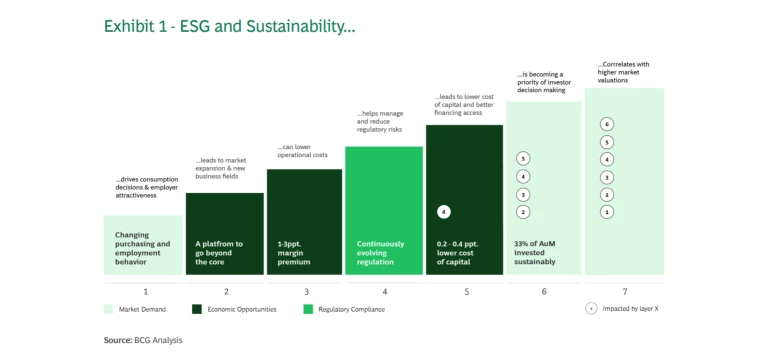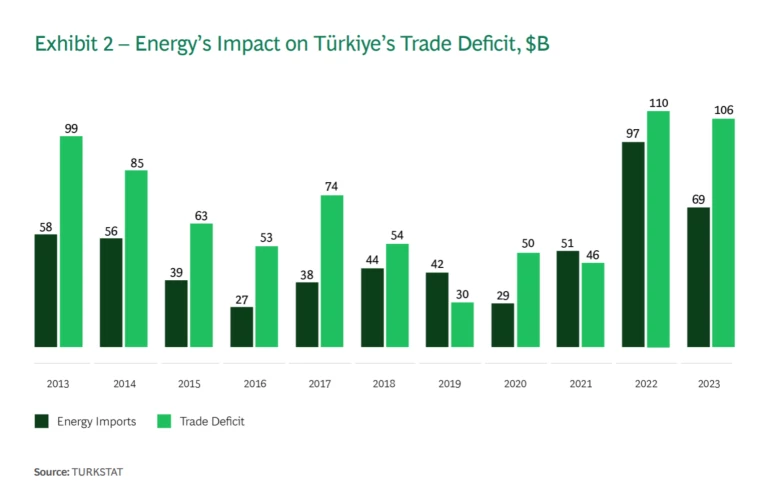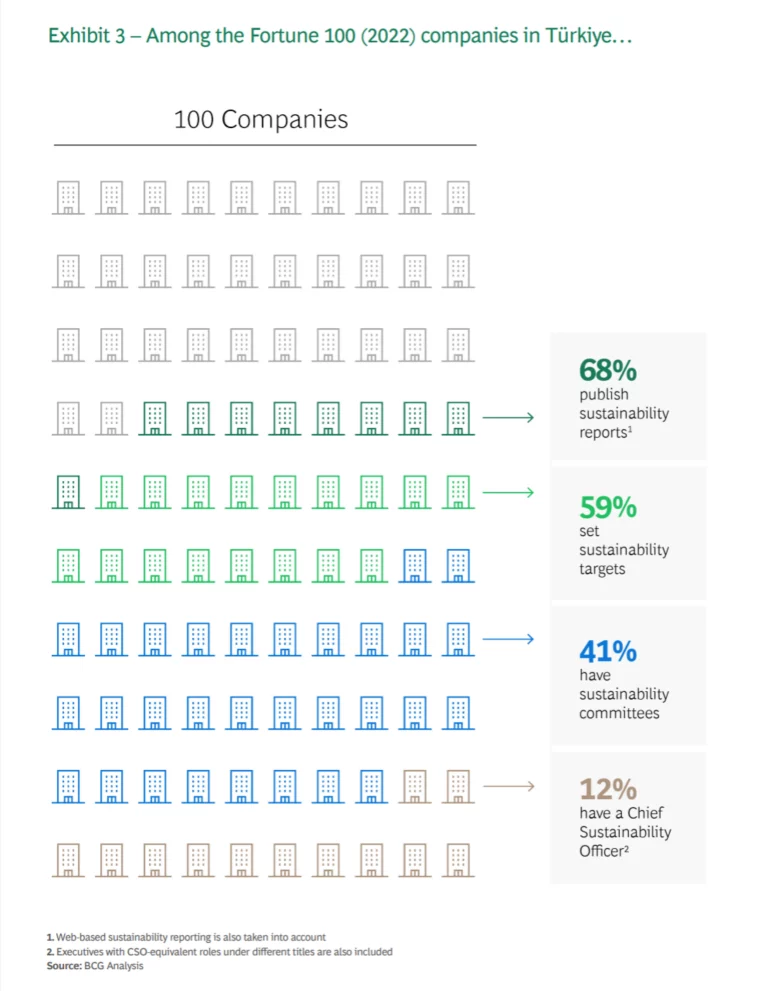In this report, Boston Consulting Group (BCG) provides a comprehensive analysis of Türkiye’s progress towards sustainable development amid global decarbonization efforts. Our approach includes a 360-degree assessment, focusing on three main areas: Türkiye’s sustainability policies and advancements, a detailed review of sustainability initiatives undertaken by the top companies in Türkiye, and an evaluation of the country’s positioning and potential in the path of sustainability.
Our objective is to deliver a detailed overview of Türkiye’s ongoing efforts and prospects in achieving sustainability. We also identify key imperatives that could further strengthen Türkiye’s role in this global movement. Consequently, this report aims to equip stakeholders with critical insights and practical guidance to navigate and accelerate the country’s journey towards a sustainable future.
3 Main Sources of Motivation for Emerging Market (EM) Companies for Sustainability Initiatives
Climate action is progressively becoming more critical for the future of our planet to ensure both environmental sustainability and economic resilience. Businesses are increasingly drawn to decarbonization primarily due to 3 main immediate motivations: (i) regulatory compliance, (ii) market demand, and (iii) economic opportunities.
Regulations such as the EU’s Carbon Border Adjustment Mechanism (CBAM) set a legal framework for reducing emissions, while growing market demand in sustainability pressure companies to adopt greener policies. Additionally, economic benefits such as cost savings provide strong incentives. However, in EMs, where regulatory compliance and market demands are developing, the economic opportunity becomes the major motive for sustainability, causing a lagged or limited transformation in the market.

Türkiye’s Strategic Sustainability Journey Shows Notable Progress with More Grounds to Cover
Türkiye, one of the major EMs and a key trading partner of developed economies, is also experiencing a path towards sustainability that is marked by global and regional alignments. These steps include communicating sustainability targets, as exemplified by the ratification of Paris Agreement, and preparing for requirements of regulations such as CBAM. Türkiye is also actively pursuing energy transition, underscored by initiatives in renewable energy and energy efficiency.
These efforts not only support Türkiye’s aim for energy independence but also contribute to reducing its current account deficit (energy imports account for over 60% of the deficit). Furthermore, despite currently not having a fully functional emissions trading infrastructure, Türkiye is preparing to launch the Turkish Emissions Trading System (ETS) to enhance its regulatory framework for greenhouse gas reduction. Türkiye has the potential to expand its measures proactively across other areas of sustainability, starting from actions that also complement broader national strategic objectives.

Türkiye’s Business Community Also Advances in Pledges with Gradually Materializing Actions

Businesses in Türkiye are also progressively embracing sustainability, primarily driven by the economic opportunities, similar to other EMs. This shift is exemplified by the emergence of pioneering ventures like TOGG and Siro in the mobility sector, which have tapped into new sustainable value pools. Alongside, there’s a rising commitment to sustainability.
Between 2020 and 2022, the number of Chief Sustainability Officers (CSOs) in Türkiye’s Fortune 100 companies jumped from 4 to 12, with an 84% increase in companies setting sustainability targets and a 17% rise in those publishing sustainability reports. However, there is still a big potential for Turkish businesses to enhance consistency between its sustainability intentions and outcomes.
Türkiye’s Sustainability Shift Calls for Regulatory and Financial Steps
Along with the growing importance of sustainability among businesses, the course of Türkiye’s sustainability journey also will rely on the evolution of its regulatory framework and the availability of green financing. Currently, Türkiye’s evolution to a more mature regulatory landscape is still in progress, which makes green financing an even more vital component.
Türkiye needs approx. $100 billion in investments by 2030 to achieve its ambitious 2050 net-zero target. As such, increasing access to green financing is essential for Türkiye to effectively advance its sustainability, setting the foundation for a prosperous and sustainable future.
There Are Several Strategic Imperatives for Businesses in Türkiye
Businesses in Türkiye should integrate sustainability into their operating models and strategic processes to boost their resilience and competitiveness.
Operating model changes required include (i) embedding sustainability within daily operations, (ii) adapting business models to climate change, and (iii) leveraging sustainable innovations; these must supported by key enablers of (iv) collaborations with policymakers and (v) a focus on sustainable know-how.













